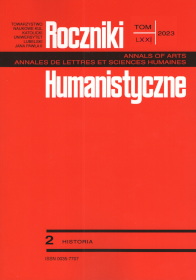Być jak Ezechiasz król judzki. Władysław II Jagiełło pod Grunwaldem w świetle kazania De divisione Apostolorum z rękopisu klasztoru Paulinów na Skałce w Krakowie B23 z II połowy XV wieku
To Be Like Hezekiah, King of Judah. Władysław II Jagiełło at Grunwald/Tannenberg in Light of the Sermon De Divisione Apostolorum from the Manuscript of the Paulite at Skałka Monastery in Kraków B23 from the Second Half of the 15th Century
Author(s): Krzysztof BrachaSubject(s): History, Middle Ages, 15th Century
Published by: Towarzystwo Naukowe KUL & Katolicki Uniwersytet Lubelski Jana Pawła II
Keywords: Battle of Grunwald/Tannenberg 1410; preaching; historical memory
Summary/Abstract: A manuscript from the second half of the 15th century, originating from the Cathedral of Kraków and now forming part of the collections of the Library of the Paulite Fathers at Skałka Monastery in Kraków, file number B23 (=BSkałka/Kraków B23), contains two collections of Sermones de sanctis by anonymous authors. In one of the three extant sermons, De divisione Apostolorum, an anonymous preacher, wishing to commemorate the victory of 15 July 1410 of the Polish allied armies of Władysław II Jagiełło over the forces of the Teutonic Order and celebrate the Victory of Grunwald/Tannenberg, which was remembered on that day in the 15th-century Kingdom of Poland, included a brief recapitulation of the battle. The lengthy story of the battle itself, incorporated into the sermon, serves as a moralizing, historical example. The preacher compared the Polish king, Władysław II Jagiełło, to the devout and righteous Hezekiah, King of Judah, and juxtaposed him with the unjust and godless Assyrian king Sennacherib, thus referencing the Old Testament’s legend of the war between these two rulers and the latter’s seizure of Jerusalem. In this way, the Polish preacher’s account of the Battle of Grunwald coincided with the commemoration of the mediaeval capture of the city (Jerusalem) by the crusaders on the same day, 15 July 1099. In a moralizing tone, he explained that the modesty of the Polish king had to be victorious over the pride of the Grand Master, Ulrich von Jungingen. The Grunwald sermons constitute an element of the phenomenon of memorization of history, or general historical memory. They – and other sources of the epoch – are still insufficiently researched in this context, and only now are disclosing their secrets and heuristic perspectives.
Journal: Roczniki Humanistyczne
- Issue Year: 71/2023
- Issue No: 2
- Page Range: 79-101
- Page Count: 23
- Language: Polish

